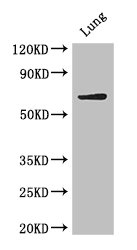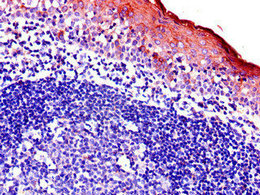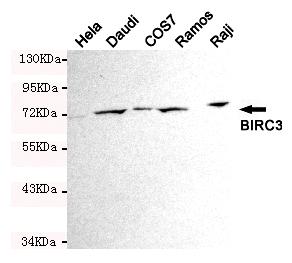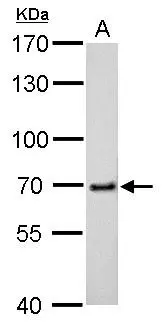
Western Blot Positive WB detected in: Mouse lung tissue All lanes: BIRC3 antibody at 4ug/ml Secondary Goat polyclonal to rabbit IgG at 1/50000 dilution Predicted band size: 69 kDa Observed band size: 69 kDa
BIRC3 Antibody
CSB-PA623808LA01HU
ApplicationsWestern Blot, ELISA, ImmunoHistoChemistry
Product group Antibodies
ReactivityHuman, Mouse
TargetBIRC3
Overview
- SupplierCusabio
- Product NameBIRC3 Antibody
- Delivery Days Customer20
- ApplicationsWestern Blot, ELISA, ImmunoHistoChemistry
- CertificationResearch Use Only
- ClonalityPolyclonal
- ConjugateUnconjugated
- Gene ID330
- Target nameBIRC3
- Target descriptionbaculoviral IAP repeat containing 3
- Target synonymsAIP1, API2, CIAP2, HAIP1, HIAP1, IAP-1, MALT2, MIHC, RNF49, c-IAP2, baculoviral IAP repeat-containing protein 3, IAP homolog C, RING finger protein 49, RING-type E3 ubiquitin transferase BIRC3, TNFR2-TRAF signaling complex protein, TNFR2-TRAF-signaling complex protein 1, apoptosis inhibitor 2, cellular inhibitor of apoptosis 2, inhibitor of apoptosis protein 1, mammalian IAP homolog C
- HostRabbit
- IsotypeIgG
- Protein IDQ13489
- Protein NameBaculoviral IAP repeat-containing protein 3
- Scientific DescriptionMulti-functional protein which regulates not only caspases and apoptosis, but also modulates inflammatory signaling and immunity, mitogenic kinase signaling and cell proliferation, as well as cell invasion and metastasis. Acts as an E3 ubiquitin-protein ligase regulating NF-kappa-B signaling and regulates both canonical and non-canonical NF-kappa-B signaling by acting in opposite directions: acts as a positive regulator of the canonical pathway and suppresses constitutive activation of non-canonical NF-kappa-B signaling. The target proteins for its E3 ubiquitin-protein ligase activity include: RIPK1, RIPK2, RIPK3, RIPK4, CASP3, CASP7, CASP8, IKBKE, TRAF1, and BCL10. Acts as an important regulator of innate immune signaling via regulation of Toll-like receptors (TLRs), Nodlike receptors (NLRs) and RIG-I like receptors (RLRs), collectively referred to as pattern recognition receptors (PRRs). Protects cells from spontaneous formation of the ripoptosome, a large multi-protein complex that has the capability to kill cancer cells in a caspase-dependent and caspase-independent manner. Suppresses ripoptosome formation by ubiquitinating RIPK1 and CASP8.
- ReactivityHuman, Mouse
- Storage Instruction-20°C or -80°C
- UNSPSC41116161







